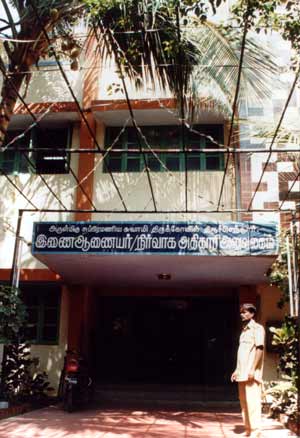
|
||||||||||||
|
| ||||||||||||
The Temple Administration
From the earliest times the control of the District authorities extended to all details connected with the temples, the collection of their revenues, the management of their lands, the regulation of their daily expenses and periodical festivals, the maintenance of their fabric, in fact, to every item of receipt and expenditure. About 1840 Government resolved to withdraw from the management of the temple, a decision which, it appears, was received with general dissatisfaction. According to the Collector's report, the people asserted that "the relinquishment of Government control would be speedily followed by the destruction of the institutions themselves." In 1841 the 350 temples then under Government management were divided into two classes "Village temples" and "District temples". The former were handed over to village committees; and of the latter, which numbered nine altogether, seven were handed over to trustees and two, the Nanguneri and Tirukkurungudi temples to jeers. The management of the lands belonging to the temple was handed over to their committees or trustees in 1849. In 1864 two District Committees, one for Saivite and the other for Vaishnavite temples, were created; and, with the exception of the Nanguneri and Tirukkurungudi temples which still continued under the control of their Jeers, those temples which until 1841 had been under Government management were handed over to the newly formed committees. By the passing of the Madras Act II of 1927 the administrative control of all the Hindu temples and their endowments in the presidency passed to a Board of Commissioners for Hindu Religious Endowments constituted by the Act. Before the provisions of the Act could be applied, Subrahmanya Swami Devasthanam was governed by a Scheme of Administration framed in OS. 4 of 1929 of the District Court, Tirunevelly. The Tirunevelly District Saiva Temple Committee, under whose management it had remained since 1864, was further abolished in 1938. The court scheme as further notified to be subject to provisions of Chapter VI-A of the Act of 1927 and by which the temple came to be administered by a Trustee assisted by a Superintendent until 1939, and later still under G.O. No. Mis. 4448 P.H. dated 12 December 1938 and Board's Order No. 1264 dated 6 March 1939 by an Executive Officer as responsible for its administration. The Administration of the temples is further strengthened since an Advisory Board of Members is constituted by the Hindu Religious Endowments Board, and responsible to it. For more information contact Tiruchendur Devasthanam Joint Commissioner / Executive Officer:
|

